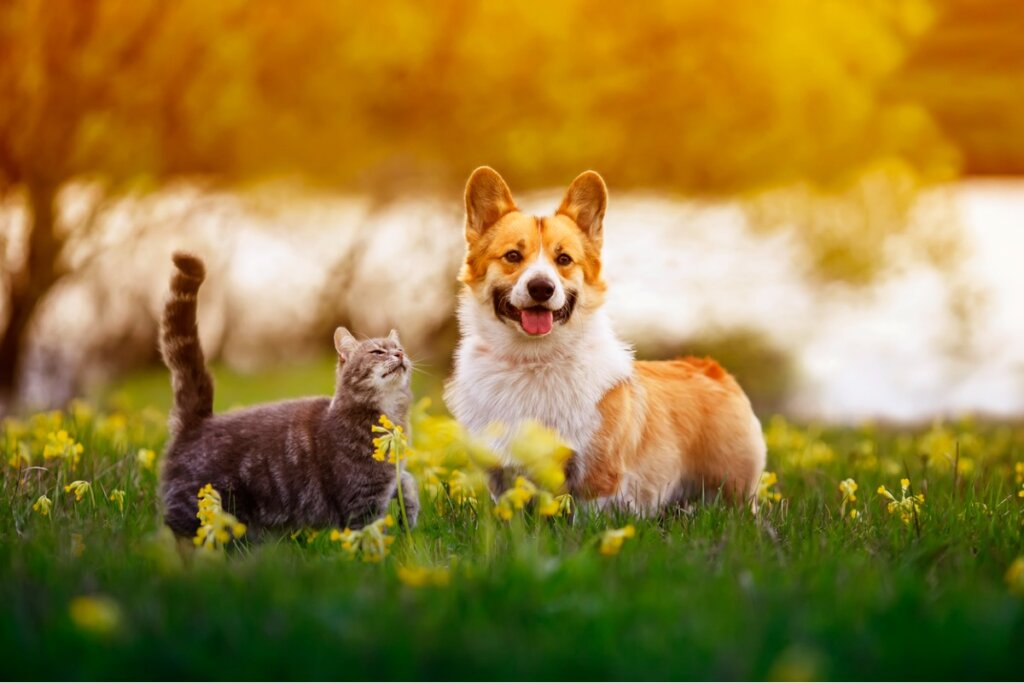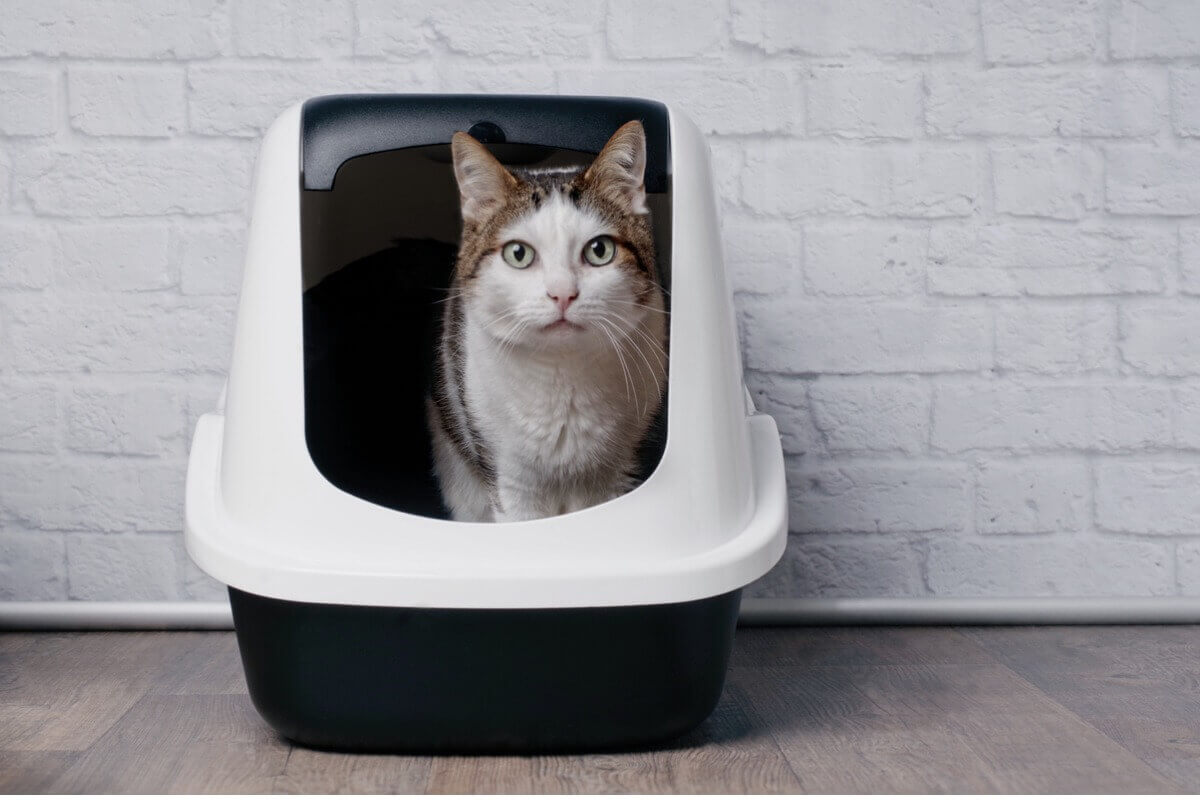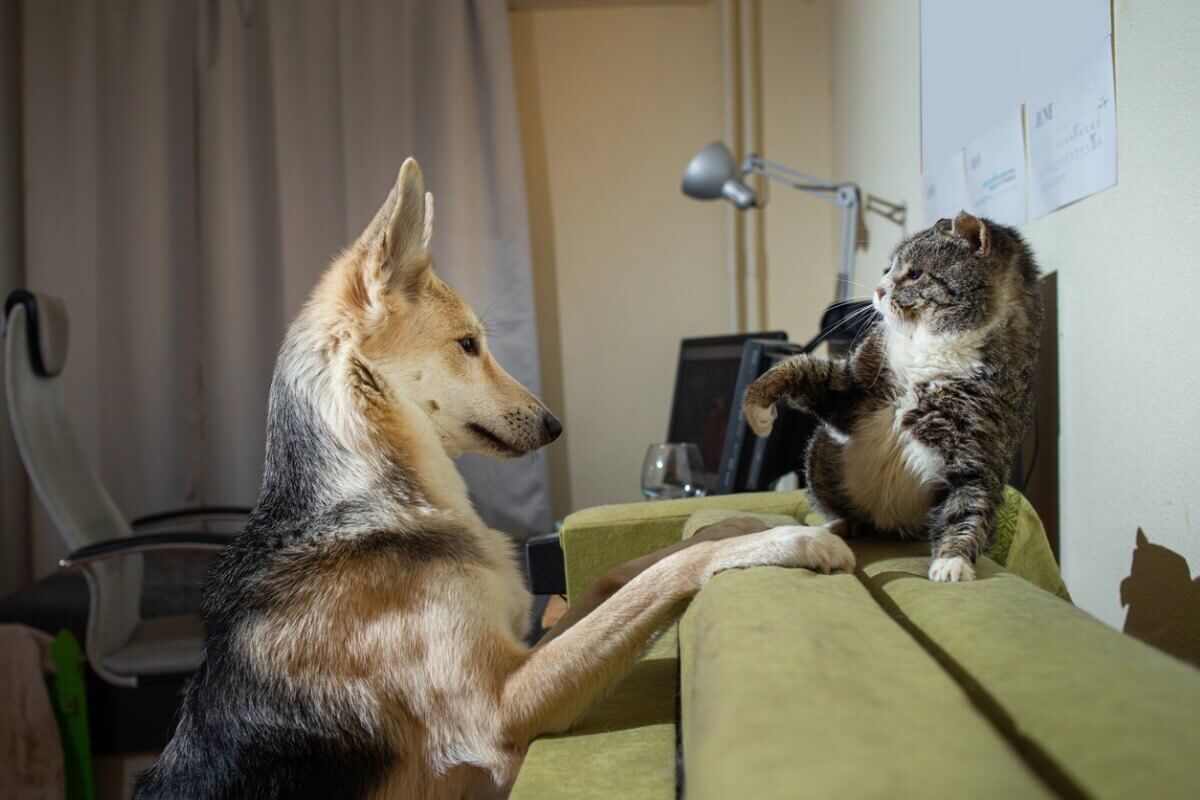My Dog Eats Cat Poop: Why?

Dog owners know that a dog eating things it shouldn’t is an everyday occurrence. No matter how much training you do, some of these animals can’t resist the temptation to put the first thing they find in their mouths. But why if your dog eats cat poop? What’s so special about these feces for canines?
For us, it’s a really unpleasant scene, but you’ll see in the following lines that there’s a reason for this behavior. However, this doesn’t mean that coprophagy is beneficial for dogs, quite the contrary. Here, you’ll learn all the details of this behavior and how to deal with it.
Why does my dog eat cat poop?
Coprophagia is the name given to the behavior of ingesting feces. It’s not necessarily an abnormal or pathological behavior, as many species resort to it for some purpose. An example of this is rabbits, which digest in two cycles, as they ingest cecotropes in order to use nutrients more efficiently.
When coprophagia is a pathological behavior, it’s included in pica disorder, which refers to behaviors of ingestion of substances that are outside the normal diet of the species. When a dog eats cat poop, this is interspecific coprophagia.
What drives a dog to eat the feces of another species? Here are the main reasons:
- Exploratory behavior: When the canine explores places where the cat has been – such as the litter box – sometimes it doesn’t limit itself to smelling and picks up what it finds nearby to recognize its surroundings, in this case, feces.
- Dirty environments: This may be a cleaning behavior in a poorly hygienic environment.
- Demand for attention Due to reinforcement of coprophagic behavior.
- Stress and anxiety.
- Boredom: lack of environmental stimulation leads to stereotypies such as coprophagia.
- Feces are highly palatable: it tastes good to dogs – like that of cats, herbivores, and other overfed animals.
- Nutritional deficiency: A deficiency of some essential nutrient may cause the dog to seek out unusual foods, such as cat feces, to try to make up for it.
- Survival instinct: This is the case with dogs that have been picked up off the streets or have been very hungry at some point in their lives. If they ate feces to survive, it’s possible that this behavior has been fixed in them.

The health risks of interspecific coprophagia in dogs
No, your dog should not be eating feces, neither his own nor that of another species. Although it’s an adaptation for survival that made sense when dogs lived in the wild, in today’s world, this behavior only brings problems. The most common ailments that result are those you can see below:
- Gastrointestinal discomfort: If the dog eats a lot of cat poop, it will be bad for him. Diarrhea and vomiting are the most common symptoms of indigestion.
- Internal parasites and bacterial infections such as nematodes, hookworms, and whipworms: The dog ingests these pathogens along with the feline feces and they settle in the digestive tract. A particularly dangerous one is Toxoplasma gondii, which causes toxoplasmosis.
- Intestinal obstruction: If the dog eats the feces directly from the cat’s litter box, it’s probably also ingesting the cat litter itself. This, along with the hairs present in the feline poop, can cause an obstruction in the intestine or stomach, as they don’t digest them.
Can a dog die if it eats cat poop?
While it’s difficult for a dog to die from ingesting cat feces, it is possible. Usually, the dog’s death is due more to the ailments associated with coprophagia than the amount of poop it ingests per se.
In the case of internal parasites, for example, some produce continuous diarrhea that severely dehydrates the animal and causes deficits when it comes to nutrients that haven’t been absorbed.
One of the most serious cases is the aforementioned toxoplasmosis, a condition in which the neuromuscular, intestinal, and respiratory systems are the most affected in the dog due to the oocysts of the parasite. The most common signs of toxoplasmosis are tremors, convulsions, uncoordinated gait, muscle weakness, paralysis, fever, and difficulty breathing.
At the same time, the consequences of gastrointestinal obstruction from eating the cat’s litter box can also be fatal. In these cases, the clogging of the intestine causes the accumulation of digested contents, which in turn causes gas due to ferment. Some of the consequences of this are necrosis of the enteral tissue or dilatation of the enteral tissue.
How do you prevent your dog from eating cat poop?
Prevention will be your best ally when dealing with this type of abnormal behavior. Although with some dogs, you always have to be on the lookout so that they don’t eat things they shouldn’t, there are certain strategies that will reduce coprophagic behavior:
- Positive training: Associate a simple command to your dog not to ingest anything from the floor. For example, when you see the animal sniffing around the litter box, give it the command and reward it if it moves away.
- Provide adequate environmental enrichment: Bored dogs are much more likely to look for things to eat on the floor. If you keep your pet busy, it won’t seek entertainment with objects and debris it shouldn’t touch.
- Clean the litter box as soon as possible: Try to dispose of your cat’s feces as soon as possible after it has defecated so that your dog doesn’t have access to it.
- Use a specialized litter box: There are a wide variety of cat boxes, some of which have openings that are too small for your dog to put his head in. Others have self-cleaning systems, which are also useful.
- Add repellent substances to the litter: Pepper or hot sauce are widely used home remedies. However, there are dogs that don’t care about the strong smell of these substances. If your dog still eats cat poop, try another system.
- Give your dog a proper diet: A quality feed supplemented with a variety of fresh food is the best option so that your dog doesn’t lack any nutrients. If you avoid nutritional deficits, you’ll be solving a part of coprophagia automatically.
- Take care of your cat’s health: If your feline is correctly dewormed and in good health, you’ll avoid many of the risks of your dog eating its feces on occasion – even if it’s still not good for it at all.

Stool eating behavior can become obsessive in some canines. That’s why, when it appears, it’s advisable to have a veterinary check-up to make sure that everything is all right regarding your dog’s health. You should also see a canine ethologist if you suspect that coprophagia is a stereotypical behavior.
All cited sources were thoroughly reviewed by our team to ensure their quality, reliability, currency, and validity. The bibliography of this article was considered reliable and of academic or scientific accuracy.
- Cubillos, J , Rodriguez, L, Bolivar, Daniela (et al). (2016). Trastornos alimenticios en animales de compañía. Corporación Educativa Nacional – CEN | Corporación Educativa Nacional. Consultado el 16 de marzo de 2023. https://mail.cen.edu.co/investigacion/volumen6.pdf#page=49">https://mail.cen.edu.co/investigacion/volumen6.pdf#page=49
- Díaz Ortíz, L. (2018). Obstrucción intestinal por cuerpo extraño en un canino (Doctoral dissertation, Corporación Universitaria Lasallista).
- Durlach, R., & Martino, P. (2009). Toxoplasma gondii: Infección en perros y gatos. Temas de zoonosis IV. Cap, 42. https://www.veterinariargentina.com/revista/2009/08/toxoplasma-gondii-infeccion-en-perros-y-gatos/
- Frenkel, J. K., Lindsay, D. S., Parker, B. B., & Dobesh, M. (2003). Dogs as possible mechanical carriers of Toxoplasma, and their fur as a source of infection of young children. International Journal of Infectious Diseases, 7(4), 292-293. https://www.researchgate.net/profile/David-Lindsay-9/publication/8976301_Dogs_as_possible_mechanical_carriers_of_Toxoplasma_and_their_fur_as_a_source_of_infection_of_young_children/links/02e7e52a73fea47ef2000000/Dogs-as-possible-mechanical-carriers-of-Toxoplasma-and-their-fur-as-a-source-of-infection-of-young-children.pdf
- Sánchez, Violeta. (2015). Estudio de la conducta alimentaria en perros con problemas de comportamiento. Universidad de Zaragoza. Consultado el 16 de marzo de 2023. https://zaguan.unizar.es/record/57486">https://zaguan.unizar.es/record/57486
- Hart, B. L., Hart, L. A., Thigpen, A. P., Tran, A., & Bain, M. J. (2018). The paradox of canine conspecific coprophagy. Veterinary medicine and science, 4(2), 106-114. https://onlinelibrary.wiley.com/doi/full/10.1002/vms3.92
- Hernández, C. A. (2010). Emergencias gastrointestinales en perros y gatos. Revista CES Medicina Veterinaria y Zootecnia, 5(2), 69-85. https://www.redalyc.org/pdf/3214/321428104008.pdf
- Nijsse, R., Mughini-Gras, L., Wagenaar, J. A., & Ploeger, H. W. (2014). Coprophagy in dogs interferes in the diagnosis of parasitic infections by faecal examination. Veterinary Parasitology, 204(3-4), 304-309. https://www.sciencedirect.com/science/article/abs/pii/S0304401714002982
- Wells, D. L. (2003). Comparison of two treatments for preventing dogs eating their own faeces. Veterinary record, 153(2), 51-53. https://bvajournals.onlinelibrary.wiley.com/doi/abs/10.1136/vr.153.2.51
